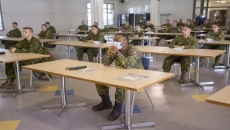OTTAWA - The ups and downs of pandemic waves continue to affect wait times for elective surgeries in Canada, adding to concerns about mounting backlogs as provinces ease restrictions, new data from the Canadian Institute for Health Information shows.
The new report shows hospitals and health systems have gotten better at weathering spikes of COVID-19 infection since the virus first struck the country in early 2020. But the number of surgeries performed still fluctuates with each pandemic wave, compounding backlogs every time.
"From an ongoing perspective, you can expect to see challenges likely across all provinces, because even if you can ramp up to what you were pre-pandemic, get your waits down, you still have that backlog you're trying to make your way through," said Tracy Johnson, director of health system analytics at CIHI.
When COVID-19 first arrived in Canada, hospitals shut down all but the most urgent surgeries to cope with the massive influx of patients.
That meant patients waiting for important, but elective, procedures like joint replacements were left to tough it out until hospitals were able to get to them or their condition became an emergency.
About 600,000 fewer surgeries were performed across Canada since the beginning of the pandemic, the institute says. About a quarter of those were joint replacements and cataract surgeries.
CIHI looked at data related to select surgeries for the first 18 months of the pandemic, which predates the Delta, Omicron and BA.2 waves.
For hip and knee replacements, only about 51 per cent of patients across Canada were treated within the recommended time frame of 182 days in the first months of the pandemic, compared to 71 per cent before the pandemic began.
Those numbers have gradually improved to 62 per cent of patients treated within the recommended time between April and September 2021.
Delays in preventive care, specialist consultations and pre-surgical tests means more people may need surgery, CIHI suggests, which could add to wait times as more patients are added to the backlog.
More urgent procedures like hip fractures and cancer surgeries were shown to have been prioritized during the pandemic, and wait times have not been significantly affected since the onset of COVID-19.
After the data for the study was collected, Canada was struck by the biggest wave of COVID-19 yet. The Omicron wave stressed health systems by putting a massive number of patients in the hospital and even more hospital staff into isolation.
Even now, as the latest wave slows down, hospitals are still stretched thin, chief public health officer Dr. Theresa Tam said at a briefing last Friday.
“Weeks of COVID-19 resurgence, including widespread illness and health-care worker absenteeism, has contributed to prolonged impacts on the health system,” Tam said.
Those impacts, including delayed surgeries, have likely added to the backlog since the last round of data was collected, Johnson said.
The federal government has dedicated a $2-billion lump sum to help provinces work through their pandemic-related surgical backlogs, but provinces have said that without long-term funding, there are limits to what that money can achieve.
The study also looked at cataract surgery and wait times for MRI and CT scans. Cataract surgery took a hit during the early days of the pandemic, but in April to September 2021, 66 per cent of patients were treated within the recommended time frame. That’s nearly back to the pre-pandemic level of 69 per cent.
Johnson said that's mainly because cataract surgery is typically performed in a clinic, rather than a hospital.
Waits for MRI scans have actually improved nationally by four or five days compared with the pre-pandemic period, though there was a huge variation between provinces. Waits for CT scans remained about the same.






